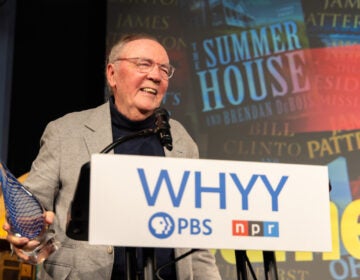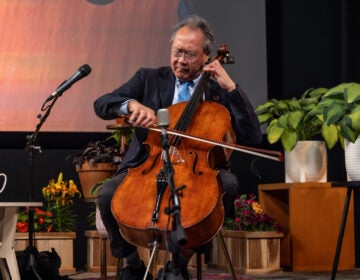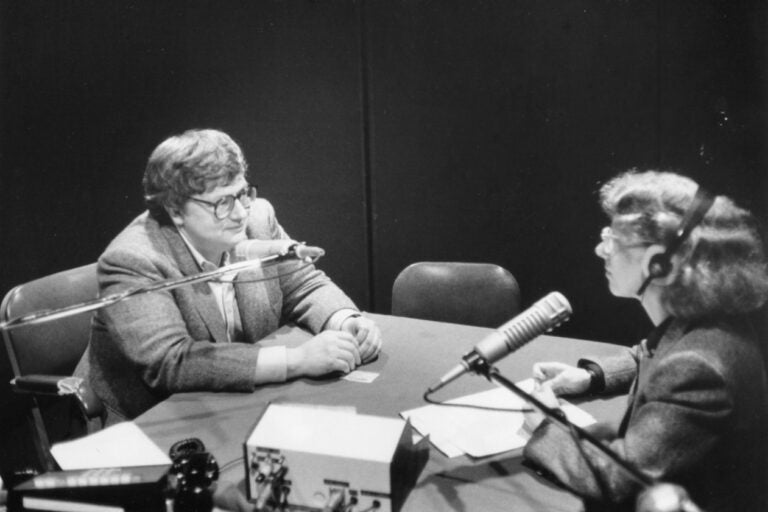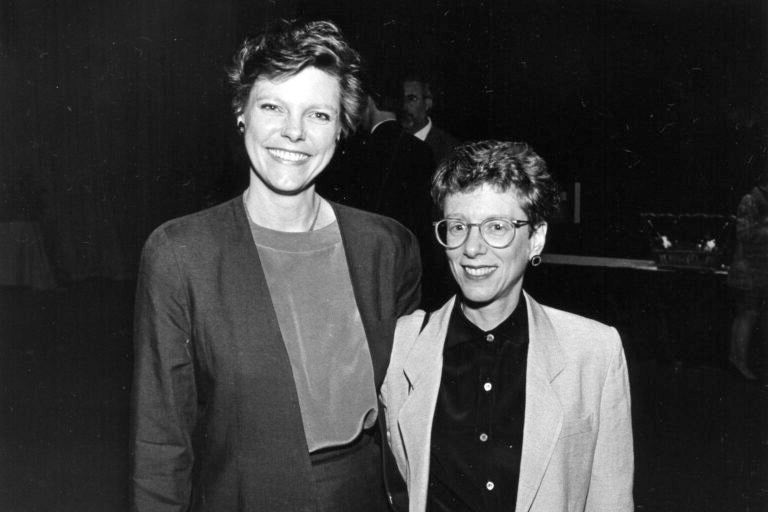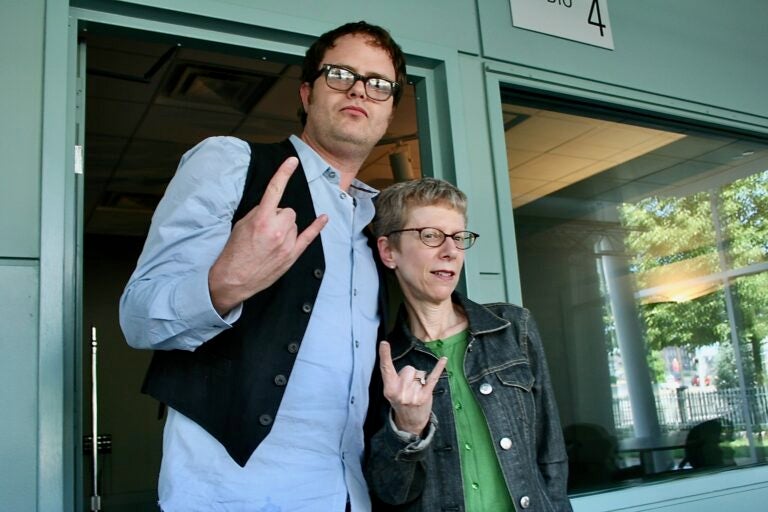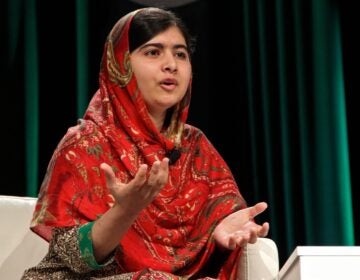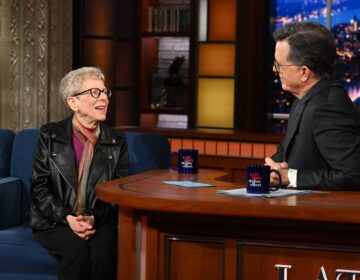50 years and over 15,000 interviews: The history and legacy of WHYY’s ‘Fresh Air’
Terry Gross has helmed one of the longest-running interview programs in America, which has been embraced by generations of listeners.
From Philly and the Pa. suburbs to South Jersey and Delaware, what would you like WHYY News to cover? Let us know!
When Terry Gross was hired away from Buffalo, New York, in 1975 to come to Philadelphia and take over an afternoon talk show called “Fresh Air,” she found herself at the head of a ragtag show on a “sleepy” radio station.
“When I came here, WHYY — which was then WUHY — was such a quiet station, mostly classical music. It had a very small listenership,” Gross said. “I thought, ‘I’m not staying here very long.’”
Launched in 1973 by David Karpoff, then the station’s manager, “Fresh Air” had been hosted by Judy Blank but was loosely structured so that members of the station’s mostly volunteer staff could sign up to do interviews with subjects of their choosing.
“When I came, it’s like, ‘I’m going to be doing the interviews. You won’t be able to just sign up,’” Gross said. “I’m going to choose the music, and the music is going to be jazz, blues, folk music, rock and roll, punk rock.”
“A lot of listeners were like, ‘What? Punk rock on my radio station?’” she said. “I got a lot of complaints.”
Fifty years and over 15,000 interviews later, Gross is still in Philadelphia, still at WHYY and still asking people questions. “Fresh Air” is now one of the most widely recognized and revered interview programs on any medium.
In September, WHYY will celebrate the 50th anniversary of “Fresh Air.” The show now broadcasts to over 3.7 million people weekly on 651 radio stations. It has featured in-depth interviews with, among others, four U.S. presidents and more than 300 Pulitzer Prize winners.
The breadth of guests is staggering, as evidenced in the online “Fresh Air” archive, where 22,000 broadcast segments are digitized, searchable and made available for free: Adam Sandler, “Weird Al” Yankovic, Alec Baldwin, Alan Dershowitz, Alex Chilton, Alex Trebek, Allen Toussaint, Ahmir “Questlove” Thompson, Amiri Baraka, Amy Poehler, Angela Lansbury — and that is just a random sampling from the letter “A.”
Gross has dipped her own toe into the stream of pop culture by appearing as a guest on “The Tonight Show,” being a brief voice actor on the animated show “The Simpsons” and appearing in a short, comic film by Mike Birbiglia about a crime heist.
In 1993, “Fresh Air” was awarded the Peabody Award for Gross’ way of asking “thoughtful and unexpected questions” and allowing “her subjects time to frame their answers.” In 2016, Gross was awarded the National Humanities Medal by President Barack Obama for her “artful probing of the human experience.”

“What makes Terry so beloved is that Terry is Terry,” said Tonya Mosley, who became the first-ever “Fresh Air” co-host two years ago. “She’s coming to every interview with her own curiosities, her own insights that she wants to gain more information on. She wants to connect with the person that she’s interviewing.”
“That has been the greatest lesson for me, and also liberation for me: to bring my full self,” Mosley said. “We’re understanding the person that we’re sitting down with, but it’s only through authenticity that that true human connection can happen.”
The origins of ‘Fresh Air’
In 1970, WHYY — then called WUHY — largely played classical and jazz music and was among the first local radio stations to become an affiliate of National Public Radio. In 1971, NPR began distributing its first national show, “All Things Considered,” which WUHY ran daily at 5 p.m.
By 1973, station manager Karpoff set about professionalizing the sound of the station by hiring Steve Brooks as a morning host, Ed Cunningham as music director and Gross as afternoon host. Cunningham said hiring Gross “changed everything.”
But filling three hours a day with original content was a Herculean task, especially when it was mainly just Gross and an intern, Danny Miller. It helped that Philadelphia was a main stop for national book tours. Authors were regularly coming through town and relatively easy to coax into a radio studio.
Miller, who is now co-executive producer of “Fresh Air” with Gross, recalls their early strategy for filling airtime.
“At 4 p.m., we knew that people were getting into their cars and they were anticipating ‘All Things Considered,’ so if we could get Maurice Sendak or Philip Roth, they’re going to be at 4 p.m.,” he said. “At 2 p.m. you want to start strong, so that’s our second-best guest.”
“At 3 p.m., it was whoever you could get,” Miller said. “We had one guest, he ran a business called Ron’s Celebrity Lookalike. Guys that kind of look like Woody Allen, kind of look like Sylvester Stallone, kind of look like Cher. That’s an example of how desperate we were.”

In its early years, “Fresh Air” ranged from high-profile interviews to broadcasting experiments. During the first years of the show, Gross had guests like singer Mel Tormé, filmmaker Frank Capra, composer John Cage and artist Chuck Close.
Those first years also featured an abstract, sonic “radio sculpture” by installation artist Jody Pinto, a “soundcast” that invited listeners to call in and add the ambient sounds of their homes directly into the live broadcast, and a panel of local bartenders circa 1978.
“When the show went national, it changed,” said longtime contributor and interviewer Dave Davies. “It used to be Terry on the air for two hours, and now it’s an hour and a more highly produced and curated show. I think a lot of longtime ‘Fresh Air’ listeners were excited for Terry and that it was getting this exposure, but they regretted losing those really long interviews where Terry would settle in and make a certain kind of magic happen.”
“When I was a production assistant — this is back in the ‘80s — I would make cassettes of interviews and take it home with me while I was washing dishes or cleaning the basement because they were that good,” he said. “An hour with Terry and a guest was something special.”
Going national
In 1985, NPR was looking for something to put on the air in the afternoon before “All Things Considered.” By then, WUHY had changed its call letters to WHYY, and was led by station manager Bill Siemering, who had previously worked at NPR. He used his contacts to pitch his local show for a national audience.
“Fresh Air” was in the right place at the right time.

“At the time, ‘All Things Considered’ started at 5 p.m. and stations were clamoring for a strong national lead-in. We became that national lead-in,” Gross said. “It was Bill Siemering, it was the Corporation for Public Broadcasting, it was NPR, and timing.”
At first, NPR picked up “Fresh Air” as a half-hour show once a week. In 1987, the Corporation for Public Broadcasting granted WHYY a five-year, $5 million grant to develop the show into an hour-long daily show with the basic format listeners recognize today.
What is old is new again
Gross’ longevity at “Fresh Air” far surpasses other interview programs on multiple mediums, including Johnny Carson (30 years), Charlie Rose (26 years) and Joe Rogan (16 years).
Gross has not been the sole interviewer on “Fresh Air” over the last half-century. Substitutes and contributing interviewers have included personalities such as Dave Davies, Sam Briger and Ann Marie Baldonado. In 2023, former “Here and Now” host Tonya Mosley, based in Los Angeles, was named co-host of “Fresh Air” along with Gross.

One of the first and most steadfast contributors to “Fresh Air” is television critic David Bianculli, whose first audio essay for “Fresh Air” appeared on the show’s national broadcast debut in 1985. He also teaches television studies at Rowan University.
“There are waves in terms of interview shows on both TV and radio where it used to be long form. Longer interviews were really wonderful when Dick Cavett, for example, would do Katharine Hepburn for a while or have John Lennon on,” Bianculli said. “With [Johnny] Carson it was: Get a good seven minutes and out. Brevity became valued.”
“It always ebbs and flows. Right now it’s podcasts,” he said. “I’m so old, I think podcasts are just radio shows distributed differently, but it seems like the podcasts that are really popular are ones where people sit down and talk to somebody else for a long time. That’s what Terry’s been doing, you know, forever.”
The podcast version of “Fresh Air” is downloaded 1.6 million times weekly and has been named among Time magazine’s 100 best podcasts of all time.
What is ‘Fresh Air’?
“Fresh Air” started out mainly as a show about culture, featuring mostly artists, writers, musicians and directors. In 1991, when the United States attacked Iraq during the first Gulf War, Gross realized “Fresh Air” had to be about more than artists and writers.
“Culture has always been the basis of the show,” she said. “But as American politics have gotten more wild, we’ve been doing a lot more on politics.”
The show now regularly features journalists explaining complex political and scientific issues, as well as the occasional oddball discussions about sleight-of-hand magic or the nature of bad breath.
What “Fresh Air” is about, to many, is conversation.
“It can be something I’m completely uninterested in — like jazz or something in the news that I haven’t ever thought about before — and I’m still rapt the entire time,” said Ian Chillag, who was a “Fresh Air” producer in the early 2000s.
Chillag has gone on to become executive producer of the NPR comedy quiz show “Wait, Wait…Don’t Tell Me!,” host of NPR’s podcast “How to Do Everything” and creator of “Everything Is Alive,” which has just been placed alongside “Fresh Air” among Time magazine’s 100 best podcasts ever.
“I’ve worked in audio for decades, and I don’t know why ‘Fresh Air’ is good. But it is. I can’t figure it out,” he said. “Its power to make you sit there is mysterious and unmatched.”
There is a method to that mystery. “Fresh Air” staff members take great pains in selecting appropriate guests and compiling research material for Gross and the other interviewers. After the recording is done, the editors prune and shape the raw interview, which can be 90 minutes or more, down to a broadcast-friendly 40 minutes.
“When I first came to the show, Terry sat down and gave me a little tutorial,” said Dave Davies. “You plan the interview in chapters. Maybe an actor’s early life and then the big break they got and then their current project. If it’s an author, you want to break it into segments because it’s going to be edited.”
“But she said, ‘Nothing that I tell you should interfere with you being you,’” Davies recalled. “‘You bring your own best insights. That’s why you’re here.’”
“It took me a moment to understand that,” Mosley said. “When we talk about intimacy and putting ourselves on the line as interviewers, there are lots of levels to that vulnerability. One of the big things is opening up my mind to let my full curiosity come to the table, so that I am a proxy for the audience.”
Good talk
Over its 50 years, “Fresh Air” has had a measurable impact on book sales. An author’s appearance on the show can create an immediate demand for the featured book.
At Huxley and Hiro, an independent bookstore in downtown Wilmington, owner Claire van den Broek put shelf signs printed with the NPR logo next to books that have appeared on the radio.
“They’re a great way to help guide people, because these days they’re tired of AI recommendations. They want to know what people they trust recommend,” she said. “We don’t have time to read everything. If ‘Fresh Air’ has covered a book, I know I can recommend it in good faith.”
It is not unusual for people to come into van den Broek’s store looking for a book they heard about on the radio but can recall neither the title or author. She and her staff regularly listen to “Fresh Air” if only to help customers find what they are seeking with the vaguest of descriptions.
“Those are the moments booksellers live for,” van den Broek said. “‘Yes, I do know what you’re looking for. I have exactly that right here.’”
The subjects that have been covered on “Fresh Air” are vast and varied, but a good conversation is timeless.
“The need for a show where we can hear a one-on-one conversation that is deep and introspective, allows our guests to be introspective, is very much needed,” Mosley said. “We need conversation and new ideas in the same way that we need water and sleep and food.”

Get daily updates from WHYY News!
WHYY is your source for fact-based, in-depth journalism and information. As a nonprofit organization, we rely on financial support from readers like you. Please give today.





